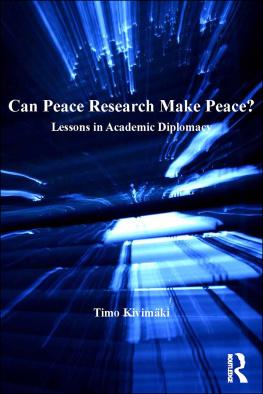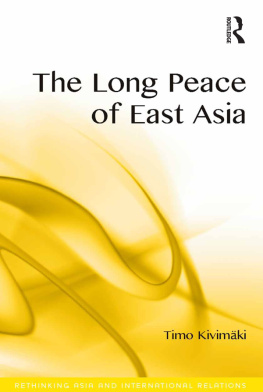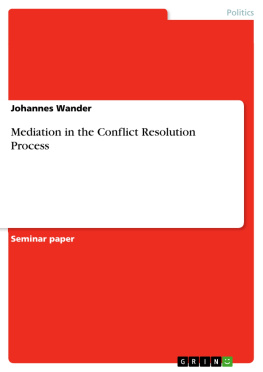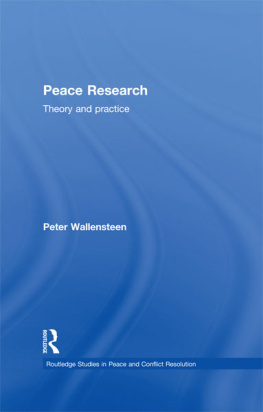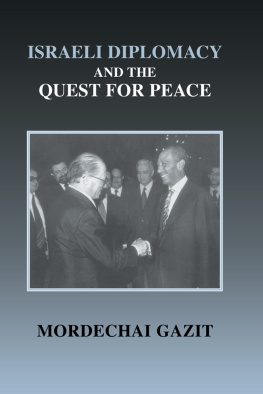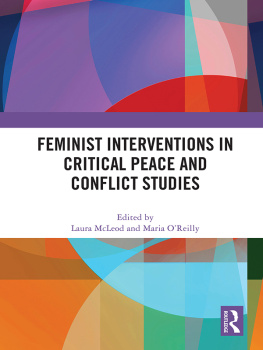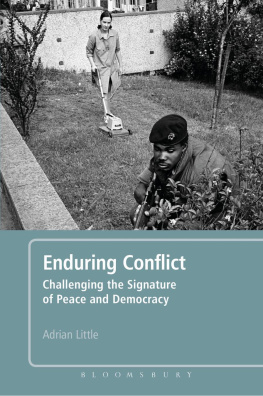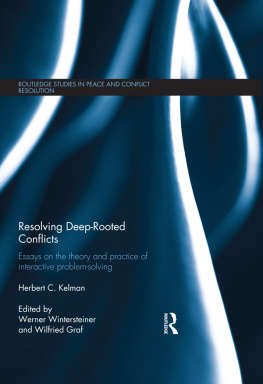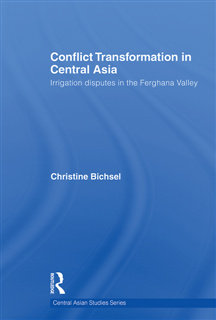CAN PEACE RESEARCH MAKE PEACE?
Can Peace Research Make Peace?
Lessons in Academic Diplomacy
TIMO KIVIMKI
University of Helsinki, Finland
and
East Asian Peace Program, Uppsala University, Sweden
First published 2012 by Ashgate Publishing
Published 2016 by Routledge
2 Park Square, Milton Park, Abingdon, Oxon OX14 4RN
711 Third Avenue, New York, NY 10017, USA
Routledge is an imprint of the Taylor & Francis Group, an informa business
Copyright Timo Kivimki 2012
Timo Kivimki has asserted his right under the Copyright, Designs and Patents Act, 1988, to be identified as the author of this work.
All rights reserved. No part of this book may be reprinted or reproduced or utilised in any form or by any electronic, mechanical, or other means, now known or hereafter invented, including photocopying and recording, or in any information storage or retrieval system, without permission in writing from the publishers.
Notice:
Product or corporate names may be trademarks or registered trademarks, and are used only for identification and explanation without intent to infringe.
British Library Cataloguing in Publication Data
Kivimki, Timo.
Can peace research make peace? : lessons in academic diplomacy.
1. Peace--Research. 2. Conflict management--Philosophy. 3. Ethnic conflict--Indonesia--Kalimantan Barat. 4. Conflict management--Indonesia--Kalimantan Barat.
I. Title
327.1'72'072-dc23
Library of Congress Cataloging-in-Publication Data
Kivimki, Timo.
Can peace research make peace? : lessons in academic diplomacy / by Timo Kivimki.
p. cm. -- (International relations monographs)
Includes bibliographical references and index.
ISBN 978-1-4094-5202-7 (hardback) 1. Peace--Research. I. Title.
JZ5534.K59 2012
303.6'6--dc23
2012018435
ISBN 9781409452027 (hbk)
ISBN 9781315570778 (ebk-PDF)
ISBN 9781317170013 (ebk-ePUB)
Contents
List of Figures and Tables
Figures
Tables
Preface
Indonesias West Kalimantan province has suffered from communal conflict, and at the turn of the millennium the province became infamous for two massive cannibalistic riots. Although the large-scale violence has not continued, there have been smaller incidents with several people killed every year, and the conflicts disputes have not been solved. Since 2001 I have led a peace studies network in East Asia, with vigorous local activities in West Kalimantan. This network has been placed on the platform of the ASEM (Asia-Europe Meeting) Education Hub (and previously on the EUAsia Link program) and it has been working in the conflict areas of West Kalimantan offering teaching on conflict resolution and peace studies in several MA classes at the local Tanjungpura University. One of the classes has been targeted at the very same ethnic leaders who mobilized the mass riots and later tried to make peace with each other. On December 15, 2008, this class stepped out of its educational setting and transferred itself into a peace process under the auspices of the vice president of Indonesia. This transition could offer a model of how purely academic work can serve the purpose of capacity-building for peace and actual pre-negotiation for a peace process. It also offers the inspiration and the main research question for this book. Could experiences in West Kalimantan point to a more general strategy of practical peace research?
The present book is essentially a product of this experience of capacity-building in conflict management in West Kalimantan. Activity aimed at contributing to peace aided me in the diagnosis of the conflict in West Kalimantan. At the same time, my knowledge of the path to conflict in West Kalimantan was constantly tested by practice; whenever blocking some paths to conflicts failed to reduce violence, the diagnosis had to be revised. At the same time whenever something seemed to work for peace, it also gave some empirical support to our understanding of the dynamics of conflict.
While teaching the stakeholders of the West Kalimantan conflict ways in which other parties in various conflicts in the world have managed to help reduce violence, I learnt a lot from the students. These specialists related my lessons of comparative conflict studies to the conditions in which they themselves were experts. This is why this study cannot start without a big thanks to the police, military, ethnic leaders and civil bureaucracy of the province and districts of West Kalimantan. The two bupatis (heads of districts) of Bengkayang and Sambas, Mr. Jakobus Luna and Mr. Burhanuddin A. Rasyid, deserve special thanks for their analyses of the two main conflicts. To Mr. Burhanuddin I also owe my nickname in West Kalimantan, Pak Long, which was quickly picked up by the local and provincial media. In addition to the two bupatis, I would like to express my gratitude to the leader of the Malay association of Sambas, Mr. H. Darwis; the Madurese leaders Mr. H. Rupaat and Haji Umar Ali (leaders of Gamisma); the leader of Dayak community in Bengkayang, Dr. Yustinus Suherman Acap (the hero of the Bengkayang peace process); and the chairman of West Kalimantans Inter-Religious Communication Forum, Prof. Rector Haitami Salim. I am especially grateful to the two police chiefs of West Kalimantan, Brig. Gen. Iwan Pandjiwinata and Brig. Gen. Erwin T.P.L. Tobing, who in addition to teaching me about the conflict in the province were open-minded enough to allow me to offer my comparative conflict studies perspectives in police classes in the main conflict districts of Singkawang, Sambas, Landak, Bengkayang, and Pontianak. These police chiefs were not consumed by a paranoia that might have forced them to play safe and end the suspicious activity of a foreigner like me. The above-mentioned people were my primary teachers in addition to being the main drivers of peaceful development in West Kalimantan.
In addition to province-level administration, I have been privileged to be able to collaborate with the office of the vice president of Indonesia, from which I was able to learn a lot. The political deputy of the vice president, Professor Djohermansyah Djohan, and the Head of European Affairs of the vice presidents office, Mr. Santos Winarso deserve special thanks.
The team of the Universitas Tanjungpura (UNTAN), under the leadership of Prof. Syarif I. Alqadrie, oversaw my operations in West Kalimantan. I would not have been able to learn much about West Kalimantan without the patient guidance of Prof. Alqadrie and Mr. Erdi Abidin, who in a more academic manner were my main teachers of the specific details about the province. The amazing contacts that Professor Alqadrie had among the stakeholders of West Kalimantan, and the respect in which they held him, were the starting point of my studies in West Kalimantan. The stakeholder classes would not have been possible without the contacts, authority and organization of Prof. Alqadrie and Mr. Erdi Abidin. A foreigner could never have started any of that, no matter how many ideas and theories he might have had for West Kalimantan.
My ten years of education in West Kalimantan were funded by the European Commissions Asia Link program, the Finnish Foreign Ministry, the Finnish Embassy in Jakarta, the International Media Support (Copenhagen) and the AsiaEurope Foundation. I am also very grateful to these organizations for their great work for peace that has, as a side product, introduced me to the interesting complexities of the conflict in West Kalimantan. My research on West Kalimantan was funded by the Uppsala Universitys Program on East Asian Peace. The text of this book was edited by Mr. Jonathan Price, and the language editing was sponsored by the Finnish Foreign Ministry. I am grateful for this, and I know that my readers will be even more so.

